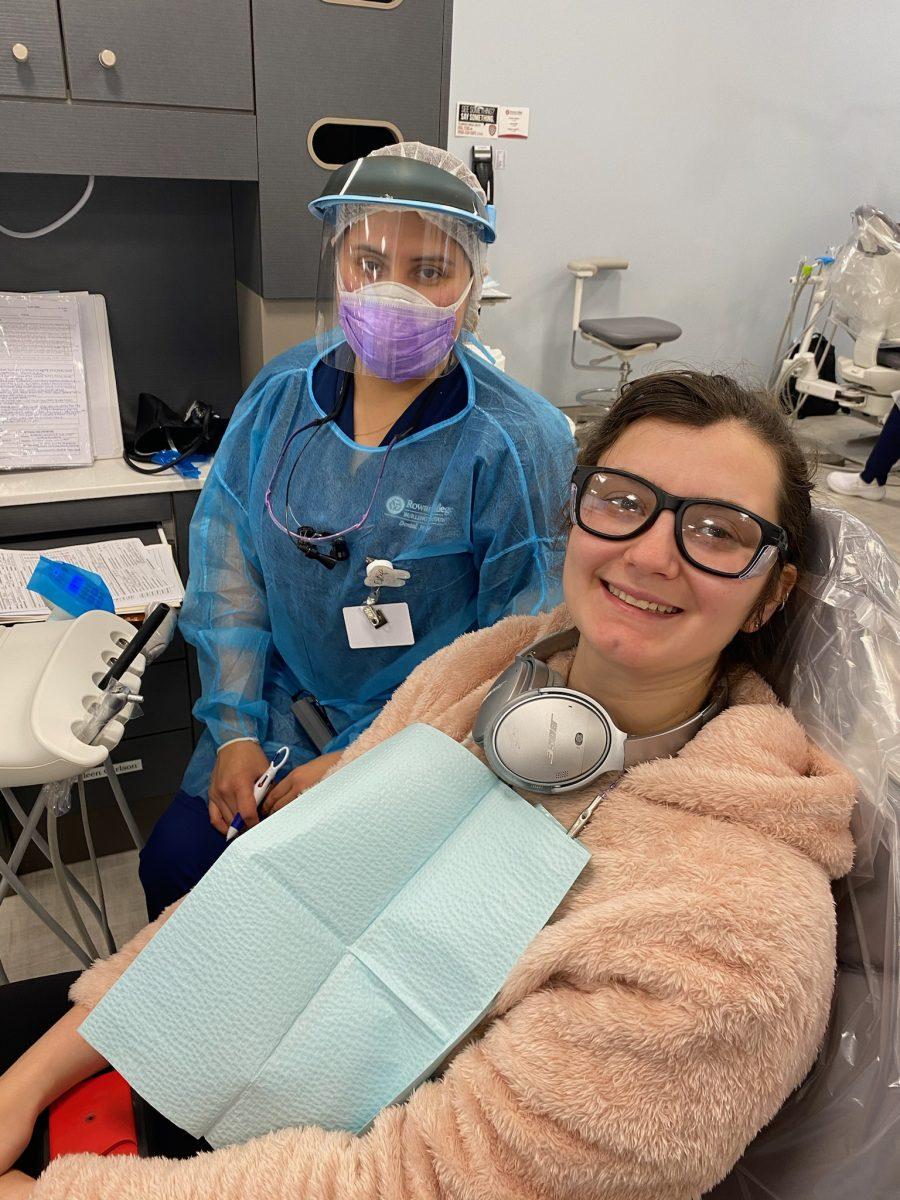For $5 and approximately seven hours of your life, Rowan College at Burlington County (RCBC) dental hygiene students will oblige to tell you everything wrong with your body from the neck up.
At least, that was what I got from the pitch that had caught my attention in an October Rowan Announcer. The resulting dynamic seems obvious: the bulk population needs to keep their teeth and their money; the students need to perform trial and error on them before graduating to work in a professional dental setting. What I found most appealing about participating in the RCBC Dental Hygiene Clinic, though, was the chance to help other students learn.
My initial consult was non-invasive, and mostly involved describing my oral health habits and concerns. Afterward, I scheduled my actual cleaning and appointment with a student, which wouldn’t occur until February due to winter break closures.
There are two ways to schedule your time slot at the RCBC Dental Hygiene Clinic: the first is to make an appointment for 8 a.m. and sit through all seven hours continuously; the second is to split up the hours over two different days beginning at 1 p.m., which I had chosen.
I was texted the day before to confirm the appointment time, and to answer questions about my COVID-19 risk and possible symptoms. The entire process was both efficient and professional.
RCBC’s Mount Laurel clinic more closely resembles an open office than it does any other dental facility I’ve ever visited. More than a dozen dental chairs and stations are separated by low cabinetry only, and without any doors. Upon entry, the unmuffled whirs and gargles of dental equipment were apparent as I was led to my own dental chair in a far back corner.
The dental hygiene student who was assigned to my mouth, Estafany, asked more questions about my medical history, and listened while I described my pains. She spent a long time looking into my mouth, taking careful notes about its state – such that she read my life and habits to a T.
She expertly discerned all of my nervous habits – the cheek biting, the chapped lip licking, the late-night tooth grinding. When she asked if I flossed, I didn’t even try to lie that I did, because I knew she could see straight into my soul through the windows of my teeth.
I had known that the three hours would entail thorough examination, but I was still surprised when Estafany acquainted me with the procedure known as “gum detachment probe.” For those unfamiliar, it involves the hygienist poking a sharp spike into your gums, six times for each tooth (for proximal, medial and distal locations – both front and back), and assigning a number to how deep it can go; one to three is good, and anything above that number suggests inflammation.
It’s about as fun as it sounds, especially since one of my readings was a four. Then, she patiently answered my questions while I asked for explanations for everything.
Estafany later took the time to explain proper technique for brushing and flossing. Though it was largely information that I’ve heard at the dentist twice a year, every year, a lot of it was also new. For example, I didn’t even know that my hypothetical flossing technique – remember, my flossing habit was marginal at best – could even be wrong. Yet there I was, looking like a fool as I pulled the string up and down. Estefany explained how to spool the floss around my fingers, giving a different length that allowed each tooth to have a clean surface, as well as how to wrap it around each tooth like a hug.
By the time that the appointment neared its end, I felt like I had learned more about my personal oral hygiene needs in one three-and-a-half-hour visit at RCBC than I had in 22 years of dental visits and public education.
Throughout my visit, I was never worried about letting a student train in my mouth with sharp objects. All students at the clinic have likely already completed coursework in pre-clinical dental hygiene, dental head and neck anatomy and dental and medical emergencies; to be allowed to work without close supervision, they’ve probably completed even more. I was always comfortable with the care and communication offered by the students and staff.
In its need for willing participants to train the next generation of dental hygienists, RCBC Dental Clinic fosters symbiosis between itself and the South Jersey community. Over half of all Americans have some form of gum disease. Those with even two periodontitis risk factors, such as genetics (my own personal risk factor), are recommended more than the two annual dental cleanings that insurance plans generally cover. Without insurance, a regular cleaning’s price tag may extend upward of $100.
The benefit of affordable dental care that RCBC Dental Hygiene Clinic creates for the South Jersey population, especially those with low income or who are under-insured, cannot be overstated. The long hours needed to dedicate to the experience may be prohibitive for some people, but the experience was, otherwise, highly accessible.
The clinic has already made at least one positive impact on me: since my visit, I’ve flossed every single day, for the most consecutive days of my life.
For comments/questions about this story, email [email protected] or tweet @TheWhitOnline.
























































































































































!["Working with [Dr. Lynch] is always a learning experience for me. She is a treasure,” said Thomas. - Staff Writer / Kacie Scibilia](https://thewhitonline.com/wp-content/uploads/2025/04/choir-1-1200x694.jpg)









































